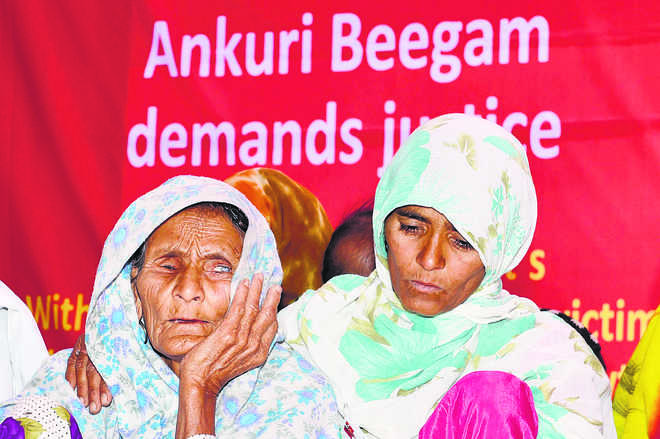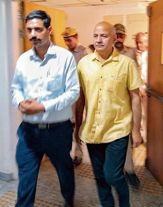
Poll Trick: A reverse consolidation, simply over minority apathy, may not be easy.
Rajesh Ramachandran
It is not every day the Prime Minister of India slams your work, so it was a joyous occasion to wake up to read Narendra Modi slamming my story in his interview to The Times of India on Wednesday. Hardly anyone other than a reporter remembers his old stories and there is nothing more heartening than to see someone else talking about them. In this case, it was an 18-year-old story that I broke, incidentally, for The Times of India. The coffin scam rocked Parliament, was a strong ingredient in the only no-confidence motion moved by Sonia Gandhi in the 12th Lok Sabha and the ‘taboot ghotala’ became a campaign slogan for the Opposition, which came to power in 2004. But as is its wont, the Congress gave the coffin scam an indecent burial very soon. Yet, this story remained my all-time favourite because despite the then Defence Minister George Fernandes threatening me with a Rs 100-crore defamation case, I had pursued it to its logical conclusion.
The Comptroller and Auditor General (CAG) in its special audit of Kargil-era purchases had found that the Ministry of Defence had paid more than the real cost for coffins imported from the US. The CAG report was scooped and published on December 11, 2001, even before it was laid in Parliament. All hell broke loose. Fernandes was not directly involved in this deal. He should have merely held an inquiry and sacked those involved in the price negotiating committee (which, interestingly, had two persons lured by sting journalists). Instead, all ire was directed at the reporter and the CAG. Even the US ambassador stepped in to give Fernandes the clean chit. But my enquiries with the Defence Supplies Centre Philadelphia (DSCP) proved him wrong. India had paid double the price the DSCP used to pay for the coffins. Parliament was rocked yet again. But that was it. Neither political beneficiaries nor award-giving gate-keepers of the Guild thought much of it. Now, 18 years later, Modi has reminded us of the ‘fake scam of Army coffins’.
Election-time scandals do not have much shelf life. Yet, every election has a defining slogan, an emotive issue or point of vulnerability among a sea of charges; something that could charge up the voters and make them want to remove the incumbent. The coffin scam was one such issue. Earlier, the Bofors scandal had struck a chord with the masses, who voted Rajiv Gandhi out in 1989. Later, the 2G scandal triggered a tsunami that swept the UPA government out of power in 2014 and reduced the Congress to just 44 seats in the Lok Sabha, its lowest-ever tally. The 2009 polls did not have an all-encompassing, emotive slogan and the Congress returned to power with an increased number of seats. PM Manmohan Singh’s clean image and the employment guarantee scheme saw the party through in those polls.
This time around, has the Opposition zeroed in on one such slogan, an emotive issue? Well, more than the Rafale deal or the jobs data, the most vulnerable point for the BJP, and a very big issue this time, is public lynching. The minorities are distressed and are getting alienated more and more from the ruling party. There aren’t very many from minority communities—directly threatened or not—who feel confident about the BJP returning to power. This is the greatest undoing of the NDA government because this has only resulted in the consolidation of a huge block of votes against the BJP across the country.
Modi and his team had carefully calibrated the 2014 poll campaign to ensure their slogans or speeches did not polarise the minority votes against the BJP. Muslims and other minority communities did not hesitate in voting the Congress and UPA out over various scams in 2014 because they were not asserting their religious identity while voting but merely choosing their representative or the PM. So, in effect it was a wave of hope and for change that swept across the Hindi heartland, with corruption and lack of development as the prime triggers.
But after the polls, the brutal killings of Muslims over allegations of cow smuggling and slaughter across the Hindi heartland have led to a consolidation of minority votes against the BJP. Along with the minorities, the Dalits, too, are angry. The Una lynching of a Dalit — condemned to do his caste occupation of skinning a dead cow — and the suicide of Rohith Vemula had left a lasting impression of alienation, which does not seem to have changed. This consolidation of the Dalit-Muslim vote is too formidable for the BJP to gloss over. The uninhibited unleashing of Hindutva campaigners like Yogi Adityanath appears to be the BJP’s response to minority consolidation.
Theoretically, a reverse consolidation is possible in such a situation. The candidature of the Malegaon blast accused Pragya Singh against Congress stalwart Digvijay Singh in Bhopal is an attempt at it. But there was no sign of a reverse consolidation in Rajasthan where the most ghastly lynching had occurred. A Hindu consolidation (like minority consolidation) is a reactive process, which needs a catalyst, usually a perceived threat to Hinduism, as in the case of Sabarimala in Kerala. The BJP could never achieve this after the Babri Masjid demolition and it appears difficult for the party to consolidate Hindu votes in its favour in the absence of an emotive, socio-political convergence point. The 2017 UP Assembly poll sweep was not engineered by a Hindutva campaign but by the promise of an attack on black money through demonetisation. Now, that promise stands belied.
So, a reverse consolidation, simply over minority apathy, may not be easy. The BJP would hope to win the voters over on the promise of a strong national security state in the backdrop of the Balakot air strikes, or farmer doles or the upper-caste quota; however, there doesn’t seem to be a reason for Hindu voters in the Hindi heartland to suddenly assert their religious identity.



























